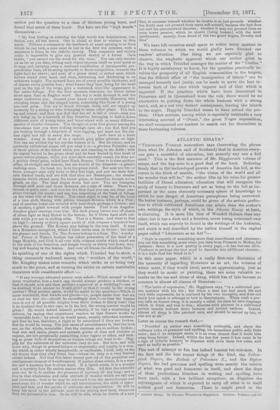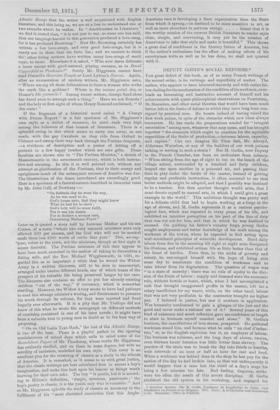ATLANTIC ESSAYS.* "THEODORE PARKER somevfhere says (borrowing the phrase from
what Dr. Johnson said of Scotland) that in America every- one gets a mouthful of education, but scarcely any one a full meal." This is the first sentence of Mr. Higginson's volume of essays, and the key-note to a good deal of the book, Believing firmly that in the undeveloped powers of America lies hid, as the statue in the block of marble, " the vision of the world and all the wonder that will be," the author lifts up his voice for greater facilities of liberal •education, education that will recognize the study of beauty in literature and art as being to the full as iin- portant, as the more obviously necessary sphere of knowledge to which he sees danger of American perceptions being narrowed.
No better instance, perhaps, could be given of the artistic perfec- tion to which cultivated Americans can attain than the author's own writings, the style of which, in the Atlantic Essays at least,
is charming. It is more like that of Wendell Holmes than any other, but it has a dash and a freedom, never losing command over itself, which can scarcely be found in the writings of the Autocrat, and which is well described by the author himself in the capital paper called "Literature as an Art ":—
" Style is capable of something more than smoothness and clearness ; you see this something more when you turn from Prescott to Motley, for instance ; there is a new quality in every page,—it has become alive. Freshness is perhaps the best word to describe this additional element ; it is a style that has blood in it."
In this same paper, which is a really first-rate discussion of the necessity of regarding literature as an art, the votaries of which must, if they would excel, serve an apprenticeship, just as they would to music or painting, there are some valuable re- marks on the use and abuse of slang, which has of late become so common in almost all classes of literature :-
"Tho habit of expression," Mr. Higginson says, "in a cultivated per- son matures with his life ; but when a man has had much life and very little expression, he is confused by his own thoughts, and does not know how much to attempt or how to discriminate. When such a per- son falls on honest slang, it is usually a relief, for then ho uses language which is fresh and real to him ; whereas such phrases in a cultivated person usually indicate mere laziness and mental undress. Indeed, almost all slang is like parched corn, and should be served up hot, or else not at all."
Later on comes the remark that,— " Provided an author says something noticeable, and obeys the ordinary rules of grammar and spelling, his immediate public asks little more ; and if he attempts more, it is an even chance that it lands him away from favour. Indeed, within the last few years it has come to be a sign of infinite humour to dispense with even these few rules, and spell as badly as possible."
This sort of attempt at fun has indeed become too common. In the first and the best recent things of the kind, the Yellow- plush. Papers, the Ballads of Policeman X., and the Biglory Papers, the bad grammar and spelling were merely the vehicle of what was good and humorous in itself, and since the days of those productions blunders in writing and spelling have been used, with a few brilliant exceptions, as disguises the extravagance of which is expected to carry off what is in itself neither good nor humorous. There is ample proof in the * Aaaratic Rasays. By Thomas Wentworth HIgensom London: TrUhnor and Co° Atlantic Essays that the writer is well acquainted with English
literature, and this being so, we are at a loss to understand one or two remarks which he makes.. In " Americanism in Literature" we find it stated that, "it is not just to say, as some one has Reid, that our language has not in this generation produced a love-song, for it has produced Browning." Now Mr. Browning certainly has written a few love-songs, and very good love-songs, but it is surely not in these that his forte lies ; and we venture to think .other living authors have written many love-songs of merit equss to these. Elsewhere it is asked, " Who now dares delineate
a lover except with good-natured, pitying sarcasm, as in David Copperfield or Pendennis?" Surely Mr. Higginson cannot have read Disraeli's Henrietta Temple or Lord Lytton's .Zanoni. Again, after an enumeration of modern writers, Mr. Higginson asks, " Where among all these delineations is there a woman who walks the earth like a goddess? Where is the incessu patuit dea, or Homer's 8'Scs yvvair,c.o I Among recent writers, George Sand alone has dared even to attempt such a thing." Have we not Romola ? and the lady at first sight of whom Henry Esmond exclaimed, " 0
deo, certe I " If the fragment of a historical novel called " A Charge with Prince Rupert " is a fair specimen of Mr. Higginson's own style as a writer of romance, he must rank very high among the followers of that branch of literature. There is a splendid swing in this which seems to carry one away, as one reads, with the gay Cavaliers as they ride from Oxford to C Manor and sweep their way back through the Puritan dragoons, —a vividness of description and a power of hitting off a portrait in a few happy touches which are rare gifts. These faculties are shown also in " The Puritan Minister," a sketch of
Massachusetts in the seventeenth century, which is both instruc- tive and amusing. In this it is well pointed out, without any
attempt at glorification of the Puritans, that to their energy and uprightness much of the subsequent success of America was due. The illustrations of the times introduced are exceedingly good. Here is a specimen of a funeral sermon described in immortal verse by Mr. John Calf, of Newbury :—
"On Sabbath-day he went his way,
As he was used to do, God's house unto, that they might know What he had for to show ; God's holy will he must fulfil, For it was his desire For to declare a sermon rare, Concerning Madame Fryer."
Later on is quoted a story told by Increase Mather and his son Cotton of a town "where two very eminent ministers were only allowed £30 per annum, and the God who will not be mocked made them lose £300 worth of cattle that year." This, we sup- pose, refers to the town, not the ministers, though at first sight it
seems doubtful. The Puritan ministers of this date appear to have been much exercised in the matter of taking to themselves a fitting wife, and the Rev. Michael Wigglesworth, in 1691, re- garded this as so important a crisis that he wooed the Widow Avery in a written discourse, still to be seen in manuscript, arranged under twelve different heads, one of which treats of the prospect of his valuable life being preserved longer by her care. The discourse also contains an offer to put, her already-existing children " out of the way," if necessary, which is somewhat startling. However, the 'Widow Avery seems to have had patience to read this strange minister's wooing, and discernment to perceive his worth through its volume, for they were married and lived happily ever afterwards. It is a pity that Mr. Trollope did not know of this when he wrote the monograph on different methods of courtship contained in one of his later novels ; it might have been a valuable hint to young men in doubt as to the best way of proposing.
" On an Old Latin Text-Book," the last of the Atlantic Essays,
is one of the best. There is a playful pathos in the opening
reminiscences of school days which calls to mind some of the Roundabout Papers of Mr. Thackeray, whose works Mr. Higginson
has evidently studied, and on them in some degree, but with no servility of imitation, modelled his own style. This essay is an excellent plea for the retaining of classics as a study in the schools of America. It is remarked, as it seems to us with great justice,
that the classic writings are best calculated first to amuse a boy's imagination, and make him look upon his lessons as things worth learning for their own sake. The boy " is poetic, but it is accord- ing to Milton's definition, simple, sensuous, passionate ;' the boy's poetry is classic, it is the youth only who is romantic." And so Mr. Higginson upholds the study of classics as necessary to the fulfilment of his " most cherished conviction that this Anglo-
American race is developing a finer organization than the State from which it sprang,—is destined to be more sensitive to art, as well as more abundant in nervous energy Grant that it is the worthy mission of the current British literature to render style clear, simple, and convincing, it may yet be the mission of Americans to take that style and make it beautiful." This shows a great deal of confidence in the literary future of America, but if the author's enthusiasm has the effect of making others of his countrymen write as well as he has done, we shall not quarrel with it.











































 Previous page
Previous page